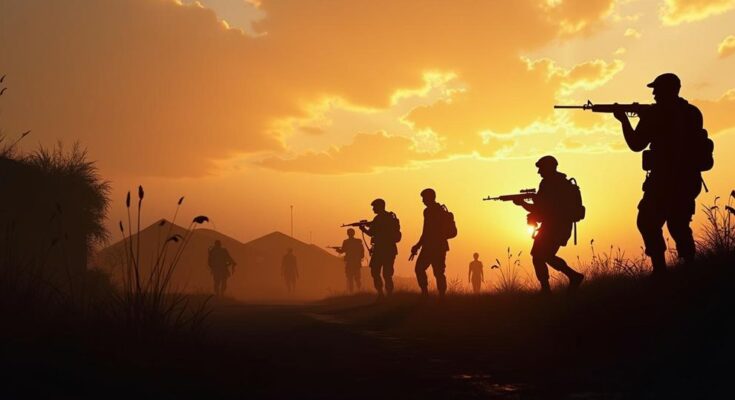Rwanda’s army and the M23 rebel group have reportedly shelled camps for displaced individuals in eastern Congo, leading to civilian casualties and aid obstruction. Human Rights Watch highlights these indiscriminate attacks while accusing Congo’s military of increasing risks for displaced persons. The ongoing violence in eastern Congo has resulted in severe human rights violations and the displacement of approximately 6 million people, amidst accusations against Rwanda regarding its military involvement and support for the M23.
Rwanda’s army, alongside the M23 rebel group it supports, has been reported to have shelled camps housing displaced individuals in eastern Congo, as per the findings of Human Rights Watch. The organization’s recent report highlights that since the start of the year, there have been indiscriminate attacks against these camps, affecting tens of thousands of vulnerable civilians. Furthermore, the report accuses the Congolese military of increasing the risk to displaced people by deploying artillery in proximity to these camps. The violence has had dire consequences; both the Rwandan and Congolese armed forces are implicated in the deaths of camp residents, as well as incidents of sexual violence and obstructions to humanitarian aid. Eastern Congo is currently grappling with instability, as over 120 armed factions vie for control of land and resources, leading to mass human rights violations such as killings and rapes that have displaced approximately 6 million individuals. The M23, a rebel group comprising predominantly ethnic Tutsis, dissociated from the Congolese military over a decade ago. This group previously launched a significant offensive in 2012, capturing Goma, the provincial capital, which remains under threat. Allegations have been made against Rwanda concerning its involvement in aggression and potential war crimes in eastern Congo. Reports from U.S. and U.N. experts suggest that Rwanda provides military support to the M23. While Rwanda has denied these allegations, it acknowledged in February the presence of its troops and missile systems in eastern Congo, citing the necessity to protect its security due to the accumulation of Congolese forces near its border. Estimates from July suggested that between 3,000 and 4,000 Rwandan troops were deployed in the region alongside the M23 forces, who have been making significant territorial gains. In a related development, a regional court in East Africa commenced proceedings regarding a case filed by Congo against Rwanda, asserting violations of its sovereignty associated with Rwandan military support for the rebels. Additionally, President Felix Tshisekedi of Congo recently called for international sanctions against Rwanda for its alleged collaboration with M23 during a United Nations General Assembly address.
The ongoing conflict in eastern Congo is characterized by rampant violence and instability driven by the activities of numerous armed groups. With over 120 factions, the region has seen extensive human rights violations, including massacres, sexual assaults, and the forcible displacement of millions. The M23 rebel group, primarily composed of ethnic Tutsis, emerged from the complex historical tensions between ethnicities in both Rwanda and Congo and has been implicated in various violent actions against civilians. Rwanda’s military presence in eastern Congo has raised significant concerns, leading to accusations of aggression and complicity in war crimes. The situation has garnered attentional not only regionally but also globally, prompting international scrutiny regarding the involvement of Rwanda and the humanitarian crisis in eastern Congo.
In summary, the actions of Rwanda’s army and the associated M23 group represent a significant escalation of violence against displaced civilians in eastern Congo. The implications of these hostilities raise critical concerns regarding human rights and regional stability. The intertwining of military aggression, humanitarian crises, and international relations presents a complex scenario that demands immediate attention from the global community to mitigate the suffering of displaced populations and address the underlying causes of violence in the region.
Original Source: apnews.com




